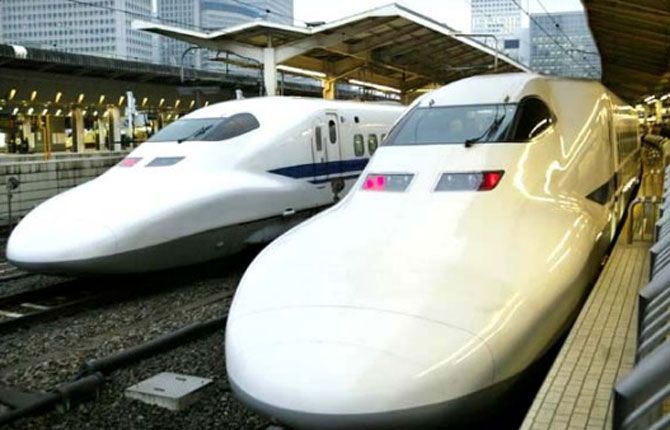The Bullet train is a childish desire of the government to join an elite club at the cost of 99.9 per cent of rail passengers, says S Pushpavanam.

A Rs 98,000-crore (Rs 980 billion) project to lay India's first bullet train network between the commercial nerve centre of Mumbai and Ahmedabad was finalised, at the summit talks between Prime Minister Narendra Modi and his Japanese counterpart Shinzo Abe last weekend.
It is fanciful, snobbish and uneconomical to have a bullet train, which is a white elephant to maintain and is totally unrelated to the needs of semi-starving millions of our country. It costs Rs 165 crore (Rs 1.65 billion) a km to lay the track; this cost, however, includes multi-level tracks, central monitoring system and protective fencing.
Apologists say that the bullet train is comparable to end-to-end travel in an inter-city express. It is less polluting, will get us more carbon credit and we will join the club of few select countries with a bullet train. Fact is, we will have less pollution if we remove the dirt and garbage on the platforms and in the trains.
Preparation of detailed project report, tendering process, land acquisition, then the actual construction, testing and commissioning will see 11 Diwalis pass by. Focus, energy and the time of our officials will be lost to the detriment of other projects. It is not foreign direct investment from Japan. It is only a loan. Other projects are crying for such funding. Even now, a 2nd AC tatkal ticket between Chennai and Mumbai costs as much as a flight ticket. So letting private players fly more planes would be cheaper.
To construct the high-speed rail corridor (two lines), 3.2 hectares of land per km is required, whereas for a six-lane highway 9.3 hectares per km is required.
An upper division clerk or a sales representative would not want to buy a Mercedes Benz simply because it is good to have one.
People travelling on roof-tops in Uttar Pradesh and Bihar is a regular occurrence. The Mumbai suburban trains carry four times their capacity. Because there was a demand for reserved seats in our express trains, the railways chose to exploit the demand by cutting down on reserved berths and selling the same as tatkal berths for a much higher price. Our unreserved carriages are a real cattle class. We do not have the capacity to run more trains.
Sixty-five years after independence, one cannot wash oneself hygienically, leave alone comfortably, in our sleeper class bathrooms. Most of our stations do not have electronic coach indicators and passengers can be seen running helter-skelter to locate the coaches.
The rat menace is persisting. We do not have enough money to execute our sanctioned projects. Former railway minister Sadananda Gowda said in his Budget speech (2014 ), "Out of 676 projects in 30 years, only 327 were completed. After spending the original estimate (Rs 1,57,883 crore), now the railway bureaucracy needs Rs 1,82,000 crore more to complete the rest. Only one out of 99 new lines sanctioned in the last 10 years has been completed.”
Sam Pitroda’s report on modernisation of the railways says it needs Rs 5 lakh crore. Anil Kakodkar’s report on safety demands Rs 1 lakh crore to make our railways safer. We require about Rs 8 lakh crore urgently now.
Fire-retardant coaches, anti-collision device, activated warning system with siren and flash in unmanned level crossings, geo-sat information, fire extinguishers in all the coaches, more fog lights, dedicated freight corridors, doubling of lines, electrifying the lines, laying new tracks are all being talked about and pending for over a decade for want of money. We do not have helicopters for accident relief. Bureaucracy bloated itself by creating eight more zones from nine to 17 and efficiency has not increased even by one per cent as the Bibek Debroy report observes.
Have you ever heard of an organisation, in the whole world, where all the members of the board of management are employees of the organisation? Only in Indian Railways can it happen. Vested interests and corruption need to be fought on a war footing.
Industrialists, chartered accountants, management experts, financial experts must be appointed to the board. Accounting reforms recommended in 1985 are yet to take off. These are the things that the railway minister must keep himself busy with. It is a childish desire to join a select club at the cost of 99.9 per cent of the passengers.
The image is used for representation purpose only.
S Pushpavanam is secretary, Consumer Protection Council, Tamil Nadu.








